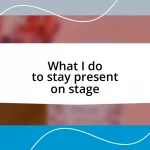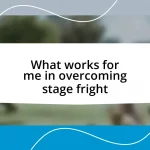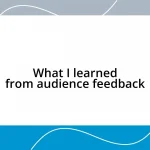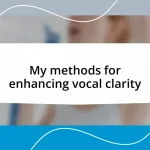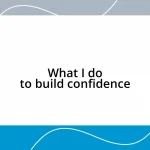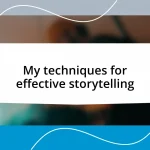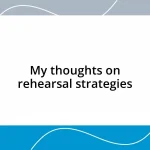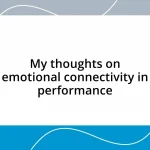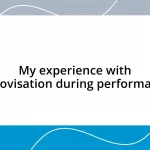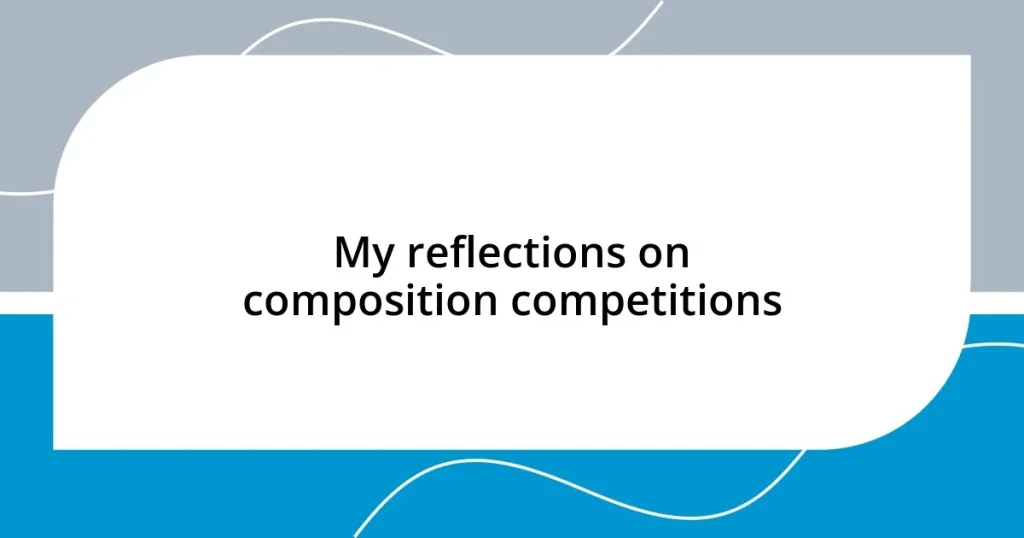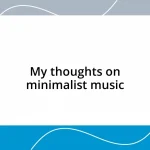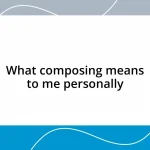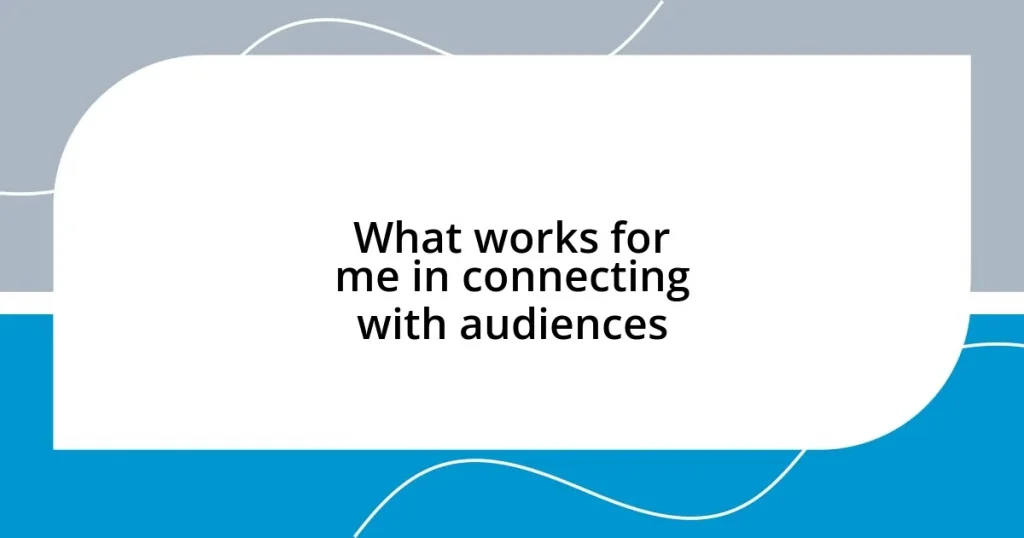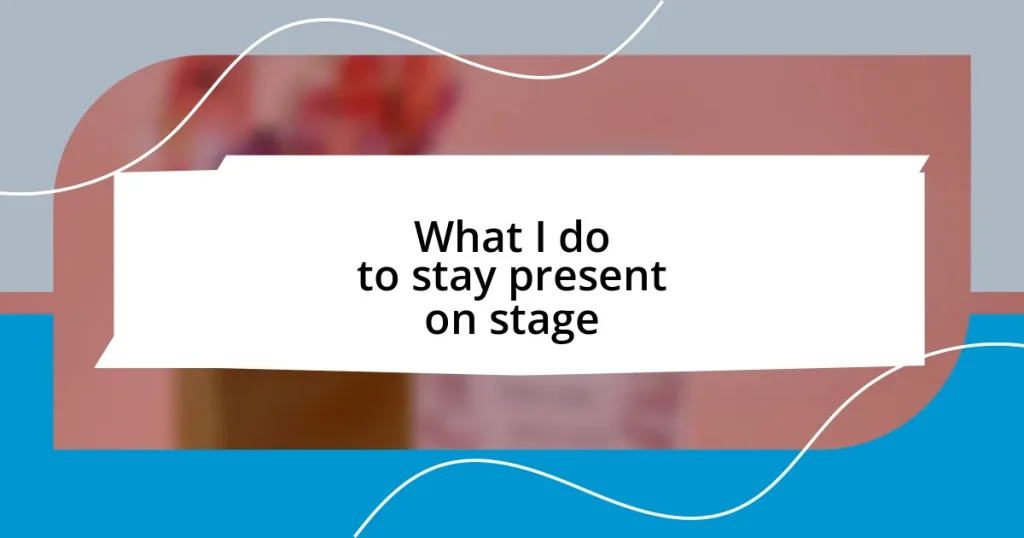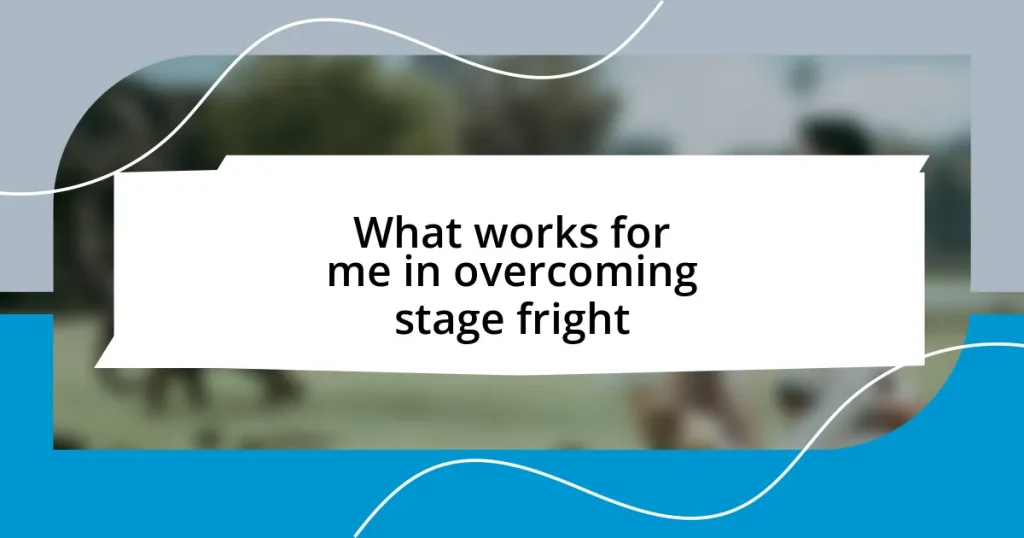Key takeaways:
- Competitions emphasize storytelling and emotional connection over technical mastery in compositions.
- The importance of community support and vulnerability in artistic expression fosters personal growth and self-discovery.
- Effective time management and seeking constructive feedback are crucial for improving compositional skills and performance outcomes.
- Future goals for composition competitions include promoting inclusivity, leveraging technology for engagement, and prioritizing mental health and well-being.
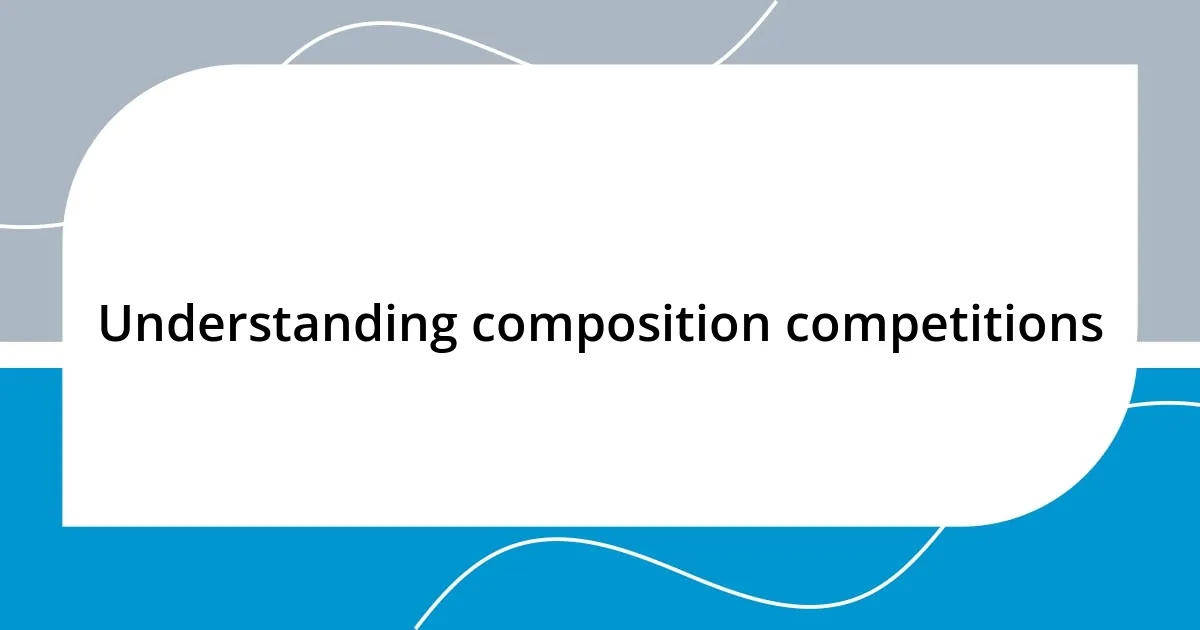
Understanding composition competitions
Composition competitions are fascinating arenas where creativity and skill are put to the ultimate test. I still remember my first competition vividly – the rush of excitement and nerves mixing together, each note woven into a tapestry of emotions. It really made me wonder: what do judges look for? Is it the technical mastery, or the heart behind each composition?
Understanding the judging criteria can be a game-changer. In my experience, it’s not just about notes on a page; it’s about telling a story and evoking feelings. I’ve seen compositions that, although simple, moved people to tears simply because they resonated on a deeper level. How often do we get lost in complex arrangements, forgetting that sometimes the simplest tunes can leave the most lasting impact?
Competitions often push musicians to embrace their unique voices, sparking growth and innovation. I used to struggle with finding my personal style, but in the process of competing, I realized that vulnerability is a strength. Have you ever felt that rush of self-discovery when you share your music with others? That connection is what truly makes a competition rewarding, beyond the accolades and recognition.
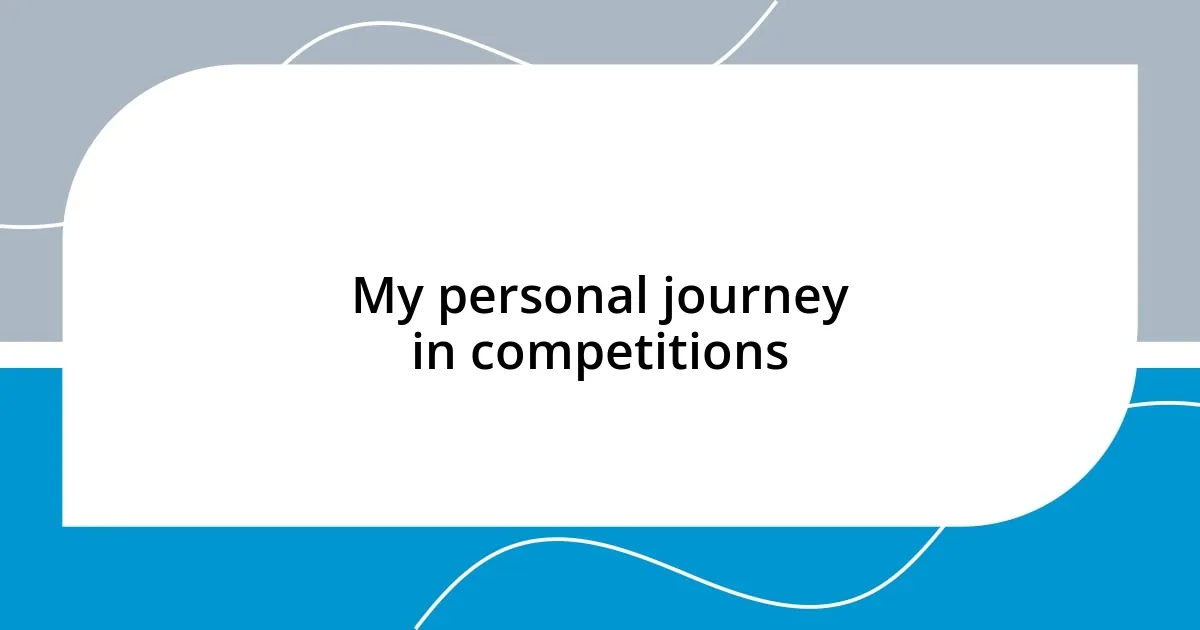
My personal journey in competitions
My journey in competitions began timidly, with my heart racing as I walked onto the stage for the first time. I remember the feeling of butterflies in my stomach, and how the lights seemed to dim everything but my piano. That moment was pivotal; I learned that each performance wasn’t just a display of skill but rather an opportunity to connect with the audience on a personal level. I felt the nerves melt away as soon as I allowed myself to express my story through music.
- Competitions taught me the importance of preparation. I spent countless nights fine-tuning my pieces, but even more valuable was the feedback I received from judges.
- I discovered resilience; after a less-than-perfect performance, I learned to focus on growth rather than defeat.
- Each contest fueled my passion, reminding me that every note has the power to evoke emotions, not just to be played flawlessly.
- I also found a supportive community among fellow competitors, sharing experiences and cheering each other on, which has been deeply rewarding.
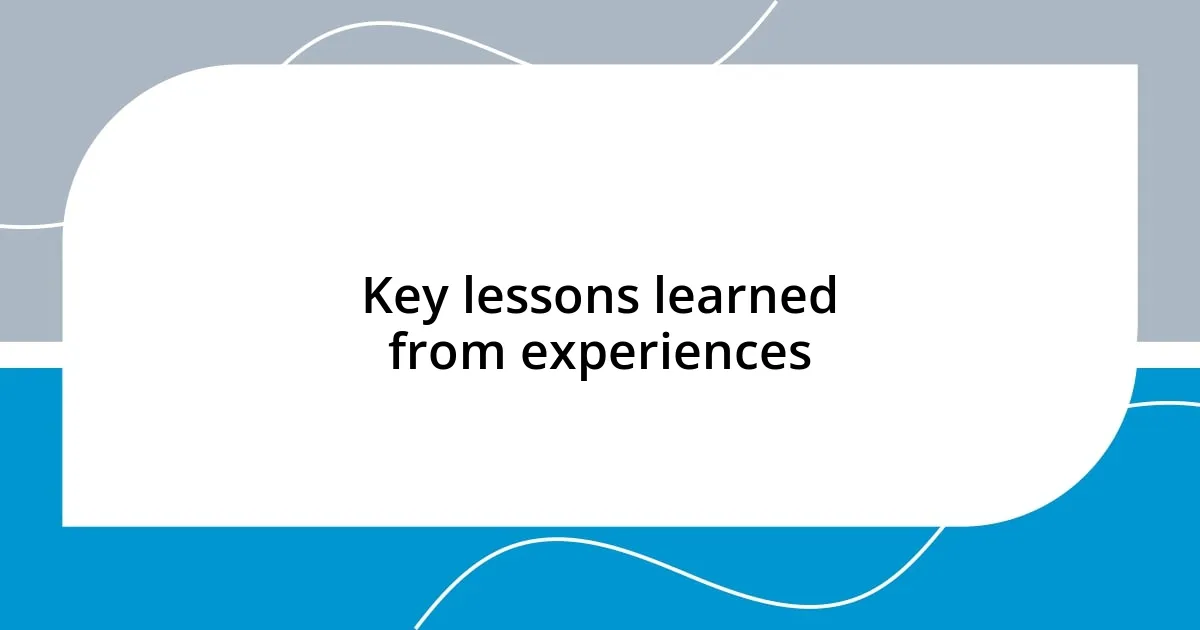
Key lessons learned from experiences
I’ve learned that each composition competition is a unique journey of personal growth. One key lesson that stands out to me is the importance of embracing feedback. During one of my earlier competitions, I received critiques that stung at first, but that moment forced me to listen, adapt, and evolve. I began to see feedback not as a setback, but as a crucial stepping stone towards bettering myself as a composer.
Another valuable insight is the power of community in these environments. I remember bonding with a fellow competitor over our shared anxieties and aspirations. Those late-night chats made it clear that we were all in this together, navigating similar fears and triumphs. This camaraderie not only boosted my confidence but reminded me that every artist has a unique voice worth celebrating.
Finally, I’ve come to understand the significance of vulnerability in performance. One particular experience stands out, where I played a piece that revealed my innermost feelings. The response from the audience was profound and taught me that authenticity resonates deeply. It’s a reminder that, in the world of composition, the heart behind the music is what ultimately ranks highest.
| Key Lesson | Personal Insight |
|---|---|
| Embracing Feedback | Initial critiques felt harsh, but they became pathways for improvement. |
| Building Community | Bonding with competitors provided immense emotional support and encouragement. |
| Vulnerability in Performance | Sharing my true emotions on stage forged a deeper connection with the audience. |
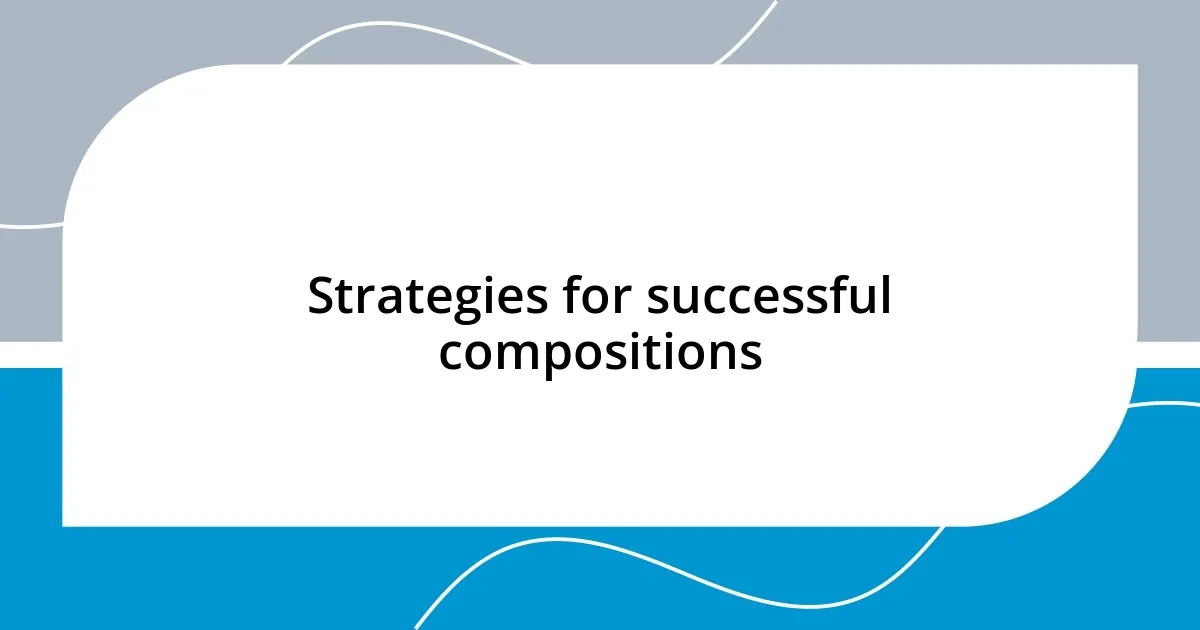
Strategies for successful compositions
When it comes to crafting a successful composition, practice isn’t just about hitting the right notes—it’s about immersing yourself in the music. I remember spending hours alone with my piano, dissecting a piece until I could play it without thinking. Have you ever felt that sweet spot where the music flows effortlessly through you? That’s where true expression begins. The more you know a piece inside and out, the more you can infuse your own emotions into it, creating a connection that transcends the performance itself.
Another strategy that has worked wonders for me is visualization before the competition. Picture this: I close my eyes and walk through every note, every emotion, and even the audience’s reactions. This mental rehearsal not only calms my nerves but also prepares me to convey the essence of my composition. Have you ever tried visualizing your performance? It can be a game changer. By imagining yourself on stage, confidently playing your heart out, you’re setting the stage for success long before the real performance begins.
Lastly, don’t underestimate the power of a supportive network. I found myself in a group of fellow artists who shared their fears and triumphs. We cheered each other on, and let me tell you, that energy is infectious! How often do we seek validation from others? Sharing experiences with them not only reminded me that I’m not alone but also inspired me to push my boundaries. There’s something incredible about knowing that others are rooting for you, and that encouragement can fuel your creativity like nothing else.
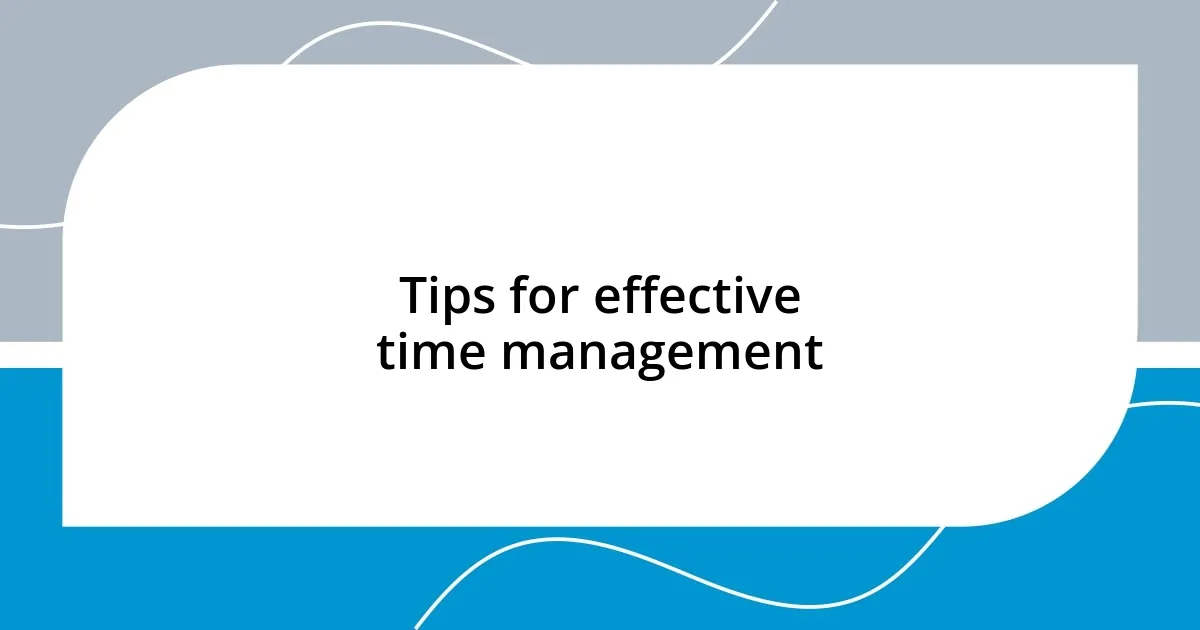
Tips for effective time management
Effective time management can make all the difference in how I approach a composition competition. I remember once feeling overwhelmed by a deadline, so I broke my work into smaller, manageable tasks. By allocating specific time slots for each section, I was able to focus better and even found a rhythm that made the process enjoyable. Have you ever tried breaking a big goal into tiny steps? It’s like turning a daunting mountain into a series of hills that you can easily conquer!
One of my go-to strategies is to create a schedule that incorporates not just writing time, but also breaks for relaxation. I’ve learned that stepping away from my work can actually sharpen my creativity when I return. During one intense afternoon, for example, I took a short walk, and the fresh air sparked a whole new idea for my composition. Doesn’t it feel great when a simple pause leads to a breakthrough?
Lastly, I’ve found that setting a timer can transform how I work. When I set a countdown for just 25 minutes, I commit to staying focused during that period. I often surprise myself with how much I can produce in that short window. Have you ever timed yourself? It’s fascinating how a little urgency can ignite a productive fire within us! Embracing these time management tips has truly given me the freedom to express myself more authentically in my compositions.
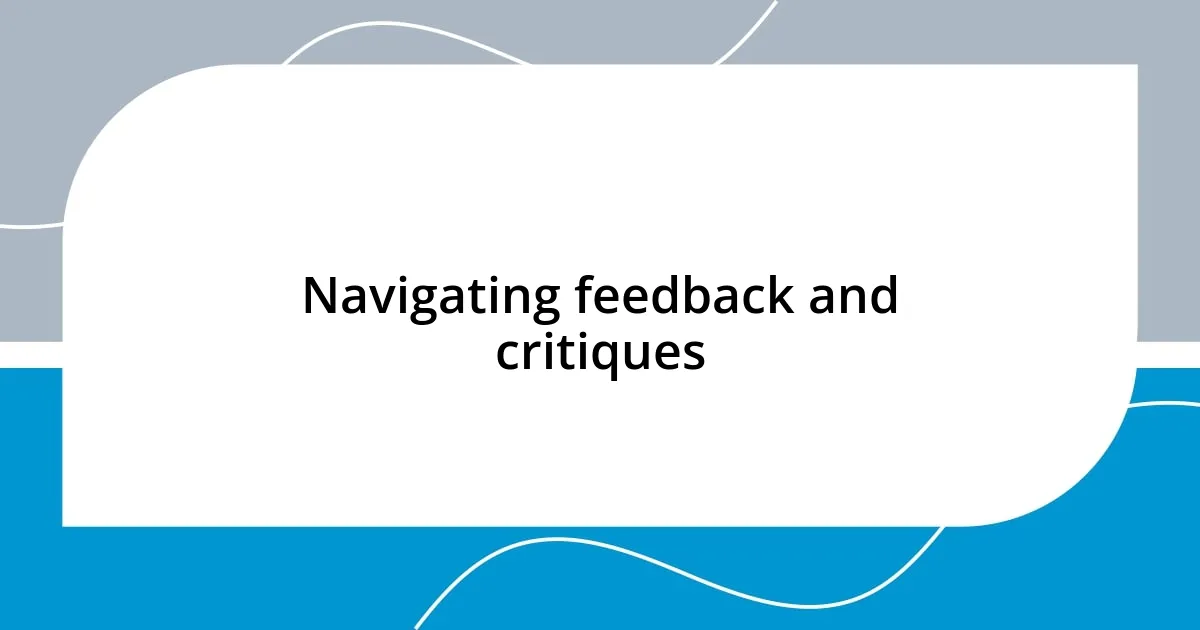
Navigating feedback and critiques
Receiving feedback on my compositions has always been a delicate balance between pride and vulnerability. I vividly recall a time when a judge pointed out areas that needed improvement, and instead of wallowing in disappointment, I chose to view it as a chance to grow. Have you ever experienced that jolt of realization when constructive criticism suddenly becomes the very tool you need for refinement? Accepting feedback—especially the insightful kind—can open up new pathways in your musical journey.
One approach that has served me well is to actively seek out feedback from trusted peers or mentors. There’s something wonderfully empowering about sharing your work in a safe space. I once played a piece for a fellow composer who offered me suggestions that felt daunting initially. But as we discussed the nuances, I uncovered layers of depth in my own creation that I didn’t initially see. Have you had anyone challenge your perspective in a way that helped you appreciate your work more?
Navigating critiques can be an emotional rollercoaster. I remember sitting in silence after a particularly harsh review, feeling the weight of every word. But with time, I learned to distinguish between subjective opinions and valuable insights. It’s a skill that’s transformed my approach; I now jot down feedback with an open heart, allowing space for reflection. Ever since I adopted this mindset, critiques have become a stepping stone, propelling me further into my artistic expression rather than holding me back.
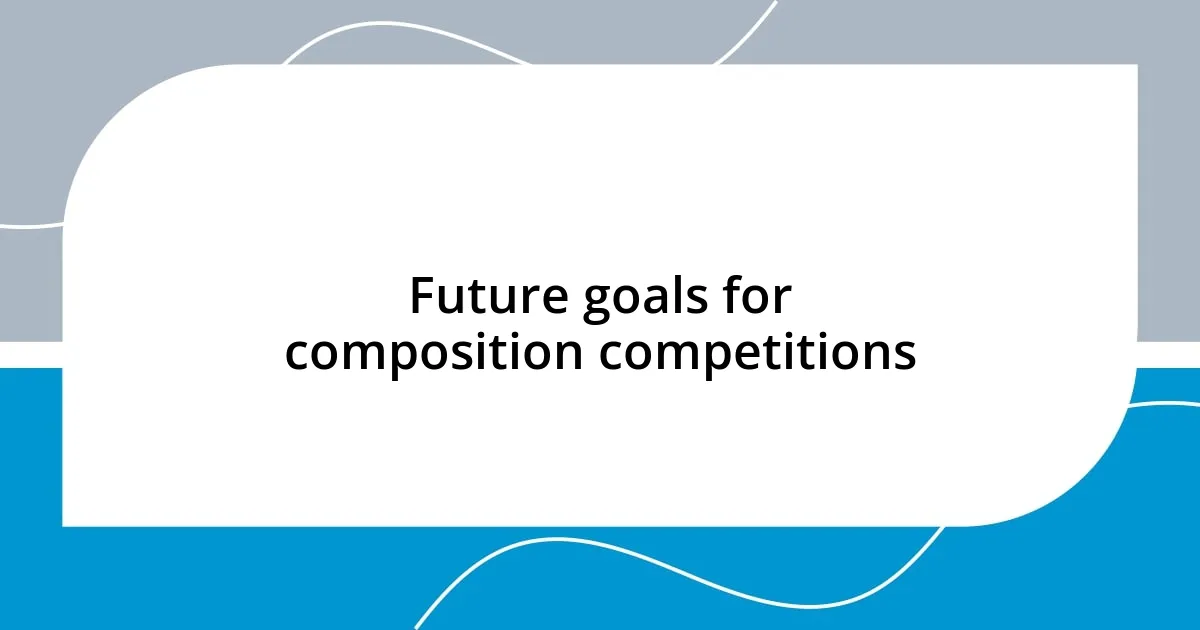
Future goals for composition competitions
It’s intriguing to think about where composition competitions might head in the future. Personally, I would love to see a greater focus on inclusivity in these events. Imagine a competition that not only welcomes diverse genres but also encourages voices from different cultural backgrounds. I recall chatting with a fellow composer from a unique musical tradition, and it struck me how much richness is added when we celebrate various influences. Wouldn’t it be amazing if composition competitions became a melting pot of creativity, where every participant felt seen and heard?
Another goal I envision is the incorporation of technology to broaden access and engagement. I think about the online platforms that allowed musicians to showcase their work during the pandemic. It opened so many doors! I can’t help but wonder, what if competitions leveraged these platforms to reach even more aspiring composers, providing real-time feedback through virtual panels? It could transform how we connect with mentors and peers from around the globe. Doesn’t it feel exciting to ponder what might be possible?
Lastly, I believe emphasizing mental health and well-being in the competitive environment would be beneficial. I’ve often found myself wrapped up in the pressure and can relate to that anxiety that sometimes comes with competition. What if future competitions included workshops on handling stress and building resilience? This could create a more positive atmosphere, where the focus is not merely on winning but on personal growth and connection. It’s food for thought. I wonder how it would change the landscape of our artistic journeys if we nurtured well-being alongside talent.


